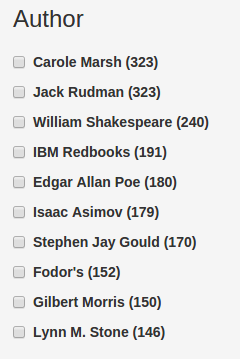ElasticSearch with faceted navigation in 15 minutes
ElasticUI is an awesome and very easy to setup framework that enables faceted navigation for ElasticSearch, written in AngularJS.
I have created an extension, which is optimized for media-search.
The design is pretty basic, but functional.
All queries and facets in the backend can be changed and configured easily, according to your needs.
Check it out on github:
https://github.com/svola/ElasticUI-extension
Of course you can also deploy this one all for free, by following the instructions here:
How to create a custom search engine in 15 minutes and deploy it for free!
Modifications
- Moved configurations into app.js
- Replaced MatchQuery with QueryStringQuery, as the syntax is more powerful
- Added formatting of result-set inspired by Calaca.
- Unifying results was also inspired by Calaca (“track by id”)
https://github.com/romansanchez/Calaca
- Bootstrap is added, to support media-items for beautifully displaying images and standard attributes.
http://getbootstrap.com/components/#media
- ng-elif is added to allow for easy case-control flow in the template. (add to module)
- In combination with the bootstrap media-objects, you can easily display different default-images based on features like category, etc.
https://github.com/zachsnow/ng-elif
New features in the template
- SignificantTerms aggregation
- Sort using buttons (Could be enhanced)
TODO:
- Make it mobile-friendly
Documentation
The main part of the project is borrowed from ElasticUI, so that’s where a lot of documentation can be found.
https://github.com/YousefED/ElasticUI
I just wanted to make a template which has more features builtin in the template, so it could already be used as search-engine and needs just some design enhancements and configuration of queries to use in the backend.
Setup
Just edit js/app.js and enter your ElasticSearch-Host and index-name.
Then edit demo.html and change all your field-names accordingly.
Queries
The queries that can be used easily in the backend are documented here:
https://github.com/fullscale/elastic.js/blob/master/dist/elastic.js
http://docs.fullscale.co/elasticjs/
And of course on the official ElasticSearch website.
http://www.elastic.co/guide/en/elasticsearch/reference/current/index.html
One of the queries that can be used is MatchQuery with all it’s parameters, that just need to be added like this in the template:
<input type="text" class="form-control" eui-query="ejs.MatchQuery('title', querystring).type('phrase')" ng-model="querystring" eui-enabled="querystring.length" />All parameters can be added like this:
ejs.QUERY_TYPE(REQUIRED_PARAMETERS).OPTIONAL_PARAMETERS(VALUE)
Mapping considerations
Usually you don’t need to create a mapping for an index with ElasticSearch, as it’s schemaless, or better, creates a schema on the fly based on the first document.
BUT if you want to provide faceted navigation, you should create an explicit mapping.
Per default each field is analyzed.
A terms facet of an analyzed field, will show you the analyzed tokens.
Which looks like this:
What you want instead, is usually this:
And for this you need to configure your mapping accordingly, before creating the index:
Usually you want the field both, intuitively searchable and “facetable”, so you should use multifields like this:
"author" : {
"type" : "string",
"analyzer" : "english", #or standard
"fields": {
"raw": { "type": "string", "index": "not_analyzed" }
}
}Your template would then look like this:
<h3>Author</h3>
<eui-checklist field="'author.raw'" size="10"&tt;</eui-checklist>http://www.elastic.co/guide/en/elasticsearch/reference/current/_multi_fields.html
Security-considerations
The app configured like this, is not secure at all.
It works nice for development, but if you use the JS-client everybody can get access to your credentials.
Please consider this:
Browser-compatibility
The app currently works with Chromium (41.xx on Ubuntu), but not with Firefox (36.xx on Ubuntu).



1 Comment so far